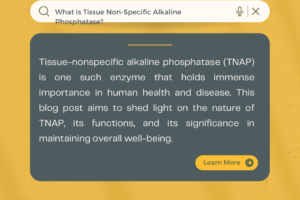Hypophosphatasia (HPP) is a rare genetic disorder that affects bone and dental development. It is caused by mutations in the ALPL gene, which codes for the tissue-nonspecific alkaline phosphatase enzyme (TNSALP). TNSALP is involved in the mineralization of bones and teeth, and a deficiency of this enzyme can lead to a wide range of symptoms.
HPP is inherited in an autosomal recessive or autosomal dominant pattern. Autosomal recessive means that a person must inherit two copies of the mutated gene (one from each parent) to develop the disorder. If only one copy of the mutated gene is inherited, then this is the autosomal dominant form and often less severe. The person could also be a carrier and usually does not show any symptoms.
There are six clinical subtypes of HPP, which differ in their severity and age of onset. The most severe form is perinatal HPP, which begins before birth and is usually fatal within a few days or weeks. The other subtypes include infantile, childhood, adult, odontohypophosphatasia (a form that only affects teeth), and a mild form that does not fit into any of the other subtypes.
The symptoms of HPP can vary widely depending on the subtype and severity of the disorder. Some common symptoms include:
- Delayed or absent development of teeth
- Dental problems, such as premature tooth loss and cavities
- Brittle or soft bones, which can lead to fractures and deformities
- Short stature
- Muscle weakness and pain
- Respiratory problems
- Neurological symptoms, such as seizures and cognitive impairment
Diagnosis of HPP is typically made through a combination of clinical evaluation, family history, and laboratory testing. Blood tests can measure levels of TNSALP and other markers of bone metabolism. Genetic testing can identify mutations in the ALPL gene.
There is currently no cure for HPP, however there is one treatment called asfotase alfa (Strensiq) that is an enzyme replacement therapy. Not everyone is eligible for treatment at this time. Overall, treatment is aimed at managing symptoms and preventing complications. Treatment options may include Strensiq, vitamin supplements, medications to increase bone density, and dental procedures to address tooth abnormalities. In severe cases, surgery may be necessary to correct bone deformities or fractures.
Overall, Hypophosphatasia is a rare genetic disorder that affects bone and dental development. Although there is no cure for HPP, early diagnosis and appropriate treatment can help manage symptoms and improve quality of life for affected individuals.
